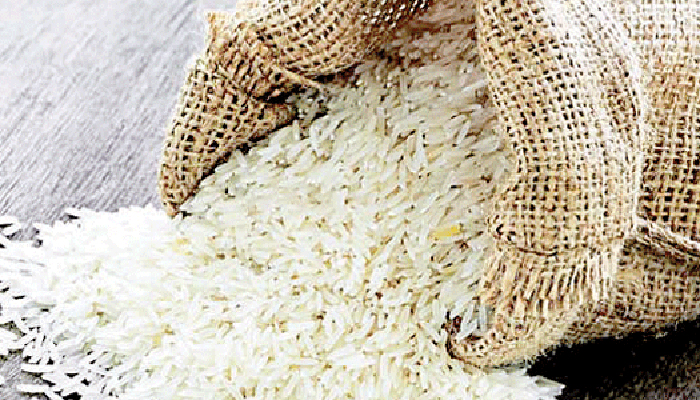Rice exporters challenge Indian GI claims on basmati in EU
KARACHI: Rice exporters have filed a detailed response to European Union (EU) in a Notice of Opposition against India’s claim on geographical indicator (GI) of long-grain aromatic Basmati rice in the EU.
India, last month, had asked the EU to recognise the fragrant, long-grain staple as originating in seven Indian states and territories, which would give its producers exclusive rights to the basmati label in the lucrative European market. Pakistan rejects India’s claim, arguing that its farmers also grow basmati rice.
“Rice Exporters Association of Pakistan (REAP) has filed a Notice of Opposition on (December 7) against India’s claim on GI of Basmati in the EU,” the association said on Tuesday in a statement.
“REAP has taken this step on behalf of rice exporters and farmers of Pakistan who are at the risk of losing a billion-dollars’ worth of income.”
Since 2006, the EU has applied zero tariffs on rice imported into the bloc that has been authenticated by either Pakistani or Indian authorities as genuine basmati.
Pakistan has a thriving industry of export of Basmati, making the country one of the top five exporters of rice in the world.
REAP said it has previously been involved in developing and revising UK Code of Practice and arranging trade delegations abroad to foster the export of Basmati from Pakistan.
“India had sought protection of its Basmati as a GI product in EU in a mala fide attempt to deter Pakistan’s growing export and appreciation of Basmati.”
Pakistan’s export of Basmati to EU has almost doubled in the last five years and it has outpaced India’s exports of the same.
The importers and customers in EU appreciate Pakistan’s Basmati more than that of India due to its exotic aroma, sweeter taste and soft texture and above all in terms of food safety including Pesticides which has resulted in increased demand.
Basmati, being a centuries old heritage of Pakistan, could not be allowed to be monopolised by India in the European market.
“Such a gross misrepresentation by India on the origins of Basmati is an attack on the values of fair competition among farmers and exporters in EU,” the statement said.
Pakistan has a legal right to export Basmati with its original name in accordance with the practice in EU which is decades old. European importers have also raised their objections against the Indian stance, and in support of Pakistan.
The statement said REAP is striving for an early legislation on the GI rules in Pakistan along with the Ministry of Commerce.
“It will enable Pakistan’s exporters and farmers of Basmati to prevent their product from being used by the same name in international markets.”
REAP said n internally registered GI of Basmati will strengthen Pakistan’s case in the coming legal stages in the EU.
REAP remains optimist that Pakistan has strong case as EU recognises the country as authentic basmati growing region. “The protection of Basmati as Pakistan’s indigenous product is crucial to sustain the rice exports, Consequently, REAP is leading the way in this endeavor without any regards to costs.”
-
 Kanye West's Best Songs: Fans Argue Over Bold Top 10 Ranking On Social Media
Kanye West's Best Songs: Fans Argue Over Bold Top 10 Ranking On Social Media -
 King Charles Secretly Relies On Advice From THIS Royal
King Charles Secretly Relies On Advice From THIS Royal -
 Jennifer Garner Reveals Beauty Choice She Makes As Botox Alternative In Her 50s
Jennifer Garner Reveals Beauty Choice She Makes As Botox Alternative In Her 50s -
 Kate Middleton Drops Four-word Message For Young Girl After Wales Visit
Kate Middleton Drops Four-word Message For Young Girl After Wales Visit -
 Shamed Andrew Uncensored ‘massages’ Should Be Refunded To Public
Shamed Andrew Uncensored ‘massages’ Should Be Refunded To Public -
 Kylie Kelce Reveals Rules She Wants Daughter Bennett To Learn At 3: No More 'passies'
Kylie Kelce Reveals Rules She Wants Daughter Bennett To Learn At 3: No More 'passies' -
 Smartphone Market Set For Biggest-ever Decline In 2026
Smartphone Market Set For Biggest-ever Decline In 2026 -
 Mud, Rain, Loincloths: All About Japan’s 200-year-old Harvest Wrestling Ritual
Mud, Rain, Loincloths: All About Japan’s 200-year-old Harvest Wrestling Ritual -
 Jonathan Majors Set To Make Explosive Comeback To Acting After 2023 Conviction
Jonathan Majors Set To Make Explosive Comeback To Acting After 2023 Conviction -
 Next James Bond: Why Jacob Elordi May Never Get 007 Role?
Next James Bond: Why Jacob Elordi May Never Get 007 Role? -
 Maddox Drops Pitt From Surname In Credits Of Angelina Jolie’s New Film 'Couture' Despite Truce From Father's End In Legal Battle
Maddox Drops Pitt From Surname In Credits Of Angelina Jolie’s New Film 'Couture' Despite Truce From Father's End In Legal Battle -
 Meghan Markle Adds Diamonds To Engagement Ring For Jordan Trip
Meghan Markle Adds Diamonds To Engagement Ring For Jordan Trip -
 Burger King Launches AI Chatbot To Track Employee Politeness
Burger King Launches AI Chatbot To Track Employee Politeness -
 Andrew’s Woes Amid King Charles’ Cancer Battle Triggers Harry Into Action For ‘stiff Upper Lip’ Type Dad
Andrew’s Woes Amid King Charles’ Cancer Battle Triggers Harry Into Action For ‘stiff Upper Lip’ Type Dad -
 Experts Warn Andrew’s Legal Troubles In UK Could Be Far From Over
Experts Warn Andrew’s Legal Troubles In UK Could Be Far From Over -
 Teyana Taylor Reflects On Dreams Turning Into Reality Amid Major Score
Teyana Taylor Reflects On Dreams Turning Into Reality Amid Major Score




